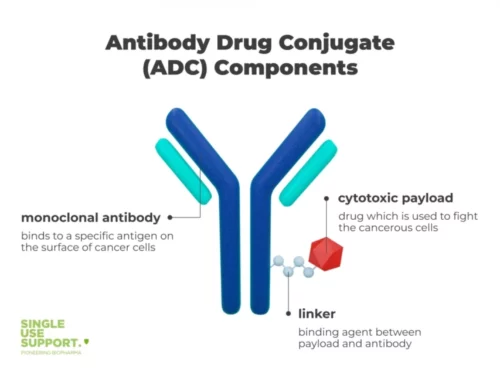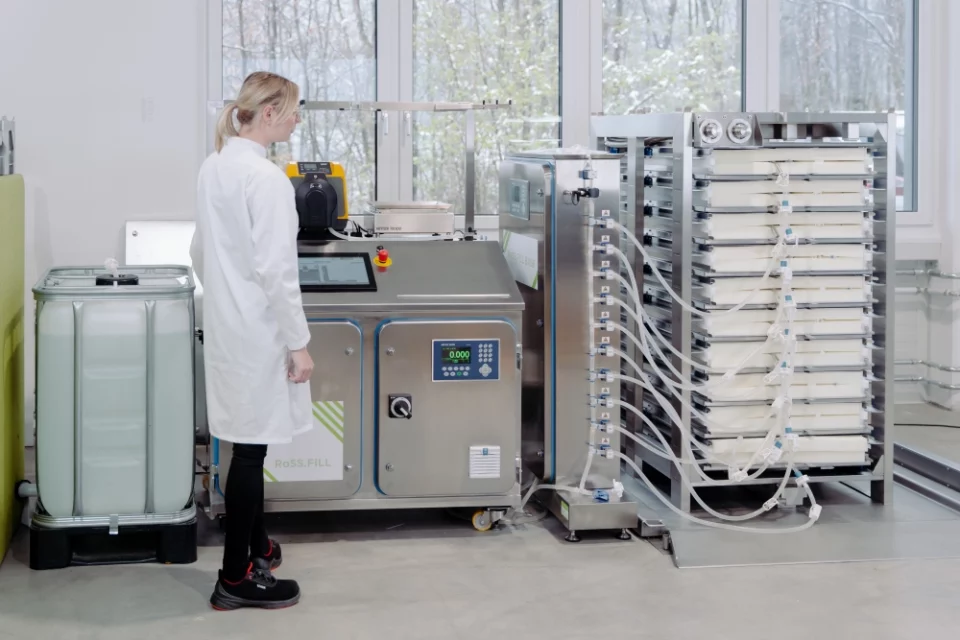Antibody Drug Conjugates (ADCs) stand out as a groundbreaking approach in targeted cancer therapy. This innovative class of drugs holds immense promise in revolutionizing cancer treatment by precisely delivering potent cytotoxic agents to cancer cells while sparing healthy tissues. However, ADCs also pose significant challenges especially in development and manufacturing that demand safe and innovative solutions.
Understanding Antibody Drug Conjugates (ADCs)
At their core, ADCs are a sophisticated combination of three key components: antibodies, cytotoxic drugs, and linker molecules.
Imagine antibodies as specialized keys that can recognize and lock onto specific proteins found on the surface of cancer cells. These proteins, known as antigens, act as unique markers that distinguish cancer cells from healthy ones. Now, imagine cytotoxic drugs as powerful payloads, capable of delivering a lethal blow to any cell they come into contact with. Lastly, think of linker molecules as the connectors that join antibodies and cytotoxic drugs together, forming a potent molecular weapon.
The beauty of ADCs lies in their precision targeting mechanism. Once administered into the body, ADCs travel through the bloodstream, guided by their antibody component to seek out and bind to cancer cells. Once attached, the ADCs are internalized by the cancer cells, where the linker molecule releases the cytotoxic drug payload, effectively destroying the malignant cell from within.

Unveiling the Promise of ADCs
ADCs provide a promising approach to cancer treatment by precisely targeting cancer cells while avoiding harm to healthy tissues, reducing side effects typically associated with chemotherapy.
Targeted Precision
One of the most compelling promises of ADCs lies in their ability to target cancer cells with remarkable precision. Unlike conventional chemotherapy, which often causes collateral damage to healthy tissues, ADCs are designed to selectively deliver cytotoxic payloads directly to cancer cells. This targeted approach minimizes systemic toxicity, thereby enhancing the therapeutic index and reducing adverse effects.
Enhanced Efficacy
By harnessing the specificity of monoclonal antibodies, ADCs offer the potential for enhanced therapeutic efficacy. Through the precise binding of the antibody component to cancer cell surface antigens, ADCs facilitate the internalization of cytotoxic payloads, thereby exerting potent cytotoxic effects specifically within malignant cells. This targeted delivery mechanism holds the promise of maximizing anticancer activity while minimizing off-target toxicity.
Overcoming Drug Resistance
Another promising aspect of ADCs is their potential to overcome drug resistance mechanisms. By leveraging novel mechanisms of action and bypassing common resistance pathways, ADCs offer new hope for patients with refractory or relapsed malignancies. This ability to circumvent resistance mechanisms underscores the transformative potential of ADCs in overcoming treatment challenges and improving patient outcomes.
Navigating the Challenges of ADC Development
Developing Antibody Drug Conjugates (ADCs) presents a promising way for targeted cancer therapy, yet it comes with considerable complexities. One major challenge lies in the intricate design and optimization process. On the other hand, a significant hurdle remains the toxicity of ADCs, which is crucial for safe development and manufacturing.
Complex Design and Optimization
The multifaceted nature of ADCs, which involves the conjugation of monoclonal antibodies with cytotoxic payloads and linker molecules, necessitates intricate engineering processes to achieve optimal drug properties. Balancing factors such as stability, specificity, and pharmacokinetics presents a formidable challenge in ADC development.
Critical to the success of ADCs is the selection of appropriate target antigens expressed on cancer cells. The identification of suitable antigens that are highly expressed on malignant cells while sparing normal tissues is a crucial task fraught with challenges. Issues such as antigen heterogeneity, antigen shedding, and antigenic drift pose significant hurdles in target antigen selection, requiring comprehensive preclinical and clinical evaluation to mitigate risks of off-target toxicity and limited efficacy.
The cytotoxic payloads incorporated into ADCs play a pivotal role in their therapeutic efficacy, yet they also present challenges in terms of potency and toxicity. Achieving the balance between sufficient potency to eradicate cancer cells and acceptable toxicity profiles represents a major challenge in ADC development.
Safe and Efficient Development and Manufacturing as a Challenge
One of the foremost concerns in ADC development and manufacturing is ensuring both efficacy and safety in the final product. Achieving this balance requires meticulous attention to detail and adherence to stringent regulatory standards, including current good manufacturing practices (cGMPs).
Controlling contamination throughout the manufacturing process is paramount to ensure product purity and prevent potential adverse effects in patients. This requires careful monitoring and implementation of strict hygiene practices at every stage of production.
Another significant challenge lies in minimizing exposure to the potent cytotoxic payloads used in ADCs. This necessitates the implementation of closed systems and robust safety protocols to protect both workers and the environment from potential harm.
Finally, as production scales up from laboratory to commercial levels, maintaining consistency and quality becomes increasingly complex. Efficiently managing scalability while eliminating product loss is crucial for cost-effectiveness and ensuring a reliable supply of ADCs for patients in need.
Innovative Solutions for ADC manufacturing
To address the challenges inherent in ADC manufacturing, innovative solutions such as automated and closed systems based on single-use technology have emerged as game-changers in the industry.
These systems offer several advantages that significantly improve the efficiency and safety of the manufacturing process. ADC manufacturers can minimize the risk of contamination, product loss, and accidents related to exposure to toxic substances. These systems operate in controlled and closed environments, reducing the likelihood of external contaminants entering the production process. Additionally, the use of single-use technology eliminates the need for cleaning and sterilization between batches, further reducing the risk of cross-contamination.
Moreover, single-use technologies offer scalability, allowing manufacturers to easily adjust production volumes according to demand. This flexibility not only streamlines the manufacturing process but also enables cost-effective production of ADCs at varying scales.
An expert for single-use bioprocessing solutions, Single Use Support has dedicated itself to solving the challenges in ADC manufacturing. The process solution provider supports manufacturers and contract manufacturers by offering automated end-to-end solutions based on single-use technology, aimed at overcoming the complexities of ADC production.
Conclusion
In conclusion, Antibody Drug Conjugates (ADCs) hold immense promise as a transformative approach in targeted cancer therapy, offering the potential for enhanced efficacy and reduced toxicity compared to traditional chemotherapy.
However, the development and clinical translation of ADCs are accompanied by significant challenges, including complex design and optimization, hurdles in target antigen selection, and safety concerns in manufacturing. Addressing these challenges requires safe and innovative technologies, and meticulous attention to detail to realize the full therapeutic potential of ADCs in improving patient outcomes and advancing the field of oncology.
Stay updated with all the insights.
Navigate news, 1 email day.
Subscribe to Qrius

